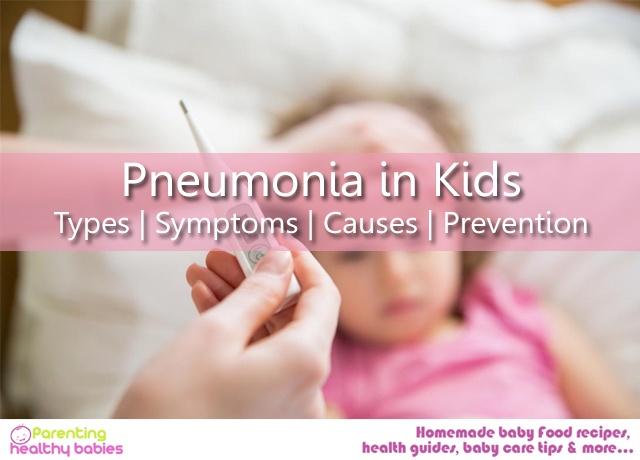What is Pneumonia?
Pneumonia is an infection in lungs (one or both). It can be caused by bacteria, viruses or fungi. Pneumonia causes inflammation in the air sacs in your lungs, which are called as alveoli that fill with fluid or pus, thus making it difficult for one to breathe. The most common type of pneumonia in adults is bacterial pneumonia. The types of pneumonia are further categorized on the basis of germs and even by location. There are a number of vaccines that are provided in order to prevent one from the disease and antibiotics that are recommended by the doctors.
Read More: Pneumonia During Pregnancy: Symptoms and Natural Remedies
Types of Pneumonia
Type (By Germs):
1. Bacterial Pneumonia
Streptococcus pneumoniae is the most common cause of bacterial pneumonia. Legionella pneumophilla and chlamydophila can also cause bacterial pneumonia.
2. Viral Pneumonia
This usually lasts for a shorter time period and is not a serious one as compared to bacterial pneumonia. In young children and older people, respiratory viruses often cause pneumonia.
3. Fungal Pneumonia
In people who inhale large amount of organisms, Fungi from soil and bird droppings can also cause pneumonia. They can also cause pneumonia in people suffering with chronic diseases or weak immune systems.
4. Mycoplasma Pneumonia
These organisms are not viruses or bacteria but they possess common traits to both. These generally cause mild cases of pneumonia in older children and young adults.
Types (By Location) :
1. Hospital acquired pneumonia (HAP)
This bacterial pneumonia is generally acquired during a stay in the hospital. This can be comparatively serious because the bacteria can be more resistant to antibiotics.
2. Community acquired pneumonia (CAP)
This type of pneu7monia develops outside of a a medical setting.
Signs and Symptoms of Pneumonia in Kids
Symptoms off pneumonia differs from person to person as it depends upon the age of the person and the cause of pneumonia. Some of the sings of pneumonia consists of the following:
- Fast breathing
- Wheezing sounds while breathing
- Vomiting
- Chest pain
- Loss of appetite
- Cough
- Fever
- Abdominal pain
- Bluish or grey colour of the lips and fingernails
- Chills
- Stuffy nose
- Finding it hard to breathe
- Lesser activities
In cases where pneumonia is in the lower part of the lungs near the abdomen, a person may not have any problem in breathing but may have fever and abdominal pain and vomiting.
Causes of Pneumonia in Kids:
A variety of germs (including viruses, bacteria, fungi and parasites) are the major causes of pneumonia. However, majority of the cases are known to have caused by viruses which includes adenoviruses, rhinovirus, influenza virus (flu), respiratory syncytial virus (RSV), and parainfluenza virus. The time duration when someone is exposed to the germ and when someone begins to feel sick depends on the bacteria or virus that has caused pneumonia. For instance, it may take around 4-6 days for RSV and only 18 to 72 hours for flu.
Kids in whom pneumonia is caused by bacteria usually become sick quickly that begins with a sudden high fever and fast breathing.
Whereas, kids in whom pneumonia is caused by viruses will show symptoms that appear gradually and are comparatively less severe. But wheezing can still be more common.
It is important to note here that several symptoms can also give vital clues about the germ that is causing the pneumonia. For instance, walking pneumonia (pneumonia due to Mycoplasma) is pretty common in older kids and teens. It causes headache, sore throat and rash.
Pneumonia due to chlamydia may cause conjunctivitis (pinkeye) in babies with no fever but mild illness.
Prevention of Pneumonia in Kids
There are some types of pneumonia that can be easily prevented by vaccines. Kids are usually given routine immunizations against Haemophilus influenzae pneumococcus and whooping cough at the age of the 2 months. On the other side, the fly vaccine is prescribed to all healthy kids aged 6 months through 19 years and especially for kids suffering from chronic illnesses such as heart or lung disorders or asthma. Moreover, babies born prematurely are at a higher risk for serious illnesses, they may get treatments that can temporarily protect them against RSV because it can otherwise lead to pneumonia in younger kids.
Doctors may also recommend to take antibiotics in order to prevent pneumonia in kids who have been exposed to someone with certain types of the same disease. Those suffering with HIV can be recommended antibiotics to prevent pneumonia caused by Pneumocystis jirovecii.
You should be extra careful if you are handing over used handkerchiefs or used tissues and immediately wash you hands with soap. Apart from this, if someone at your home is suffering from a throat infection or a respiratory infection, you should keep his or her drinking glasses and utensils separate from the ones of the other family members.
You should immediately consult a doctor in case you notice any signs or symptoms of pneumonia in your kid.
- In case he/she is having trouble in breathing or is breathing too fast.
- Has a bluish or grey colour to the fingernails or lips.
Hope this article was of help for all our parents!! Please share your comments/queries/tips with us and help us create a world full of Happy and Healthy Babies!!
